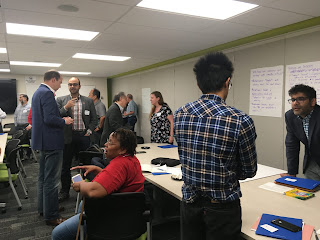Mechatronics is the discipline that addresses the many complex integrated systems used in many industries today, blending together mechanical, electrical and communication systems. It’s a complicated and complex interdisciplinary subject. Strategies for teaching and learning the fundamentals of each independent discipline as well as the whole of an integrated system are important in an educational program, but also presents challenging questions about what and how to teach it in a limited time program of study at any level.
FLATE recently participated in a 2-day workshop at Lawrence Technological University (LTU) in Southfield, MI culminating a series of 3 funded educational research events. More than 60 attendees from across the country gathered t to continue their work defining the skills and competencies that engineers, technologists, and technicians that design and work with mechatronics systems need to have now and what they will need in the future. One the first day of the workshop, educators from around the country were joined industry representatives to work in small focus groups. The room was filled with open and lively discussion and the groups filled over 30 flip charts of shared output that capture the salient points of each discussion group. The workshop organizers and P.I.’s of the project will synthesize, summarize and report their findings and recommendations to the participants and the National Science Foundation Engineering Directorate which funded the series of workshops. The intent is that mechatronics educators will use the outputs to shape their current and future programs.
In addition to the academic questions of skills and competencies needed, the workshop addressed other aspects of mechatronics educational programs. These topics included recruiting students, outreach to younger generations, diversity and inclusion issues and best ways to work with industry. Many ideas and proven practices were shared on these topics which will also be part of the project report. The workshop at LTU was the last of three planned workshops and the final report will reflect the data and input from all three events. The group has developed a community of practice that identified some opportunities to sustain itself and will be presenting and publishing a series of papers at the American Society of Engineering Education (ASEE) annual conference next summer to continue the community efforts and disseminate their findings.
To find out more, please contact Dr. Marilyn Barger (barger@fl-ate.org).
FLATE recently participated in a 2-day workshop at Lawrence Technological University (LTU) in Southfield, MI culminating a series of 3 funded educational research events. More than 60 attendees from across the country gathered t to continue their work defining the skills and competencies that engineers, technologists, and technicians that design and work with mechatronics systems need to have now and what they will need in the future. One the first day of the workshop, educators from around the country were joined industry representatives to work in small focus groups. The room was filled with open and lively discussion and the groups filled over 30 flip charts of shared output that capture the salient points of each discussion group. The workshop organizers and P.I.’s of the project will synthesize, summarize and report their findings and recommendations to the participants and the National Science Foundation Engineering Directorate which funded the series of workshops. The intent is that mechatronics educators will use the outputs to shape their current and future programs.
In addition to the academic questions of skills and competencies needed, the workshop addressed other aspects of mechatronics educational programs. These topics included recruiting students, outreach to younger generations, diversity and inclusion issues and best ways to work with industry. Many ideas and proven practices were shared on these topics which will also be part of the project report. The workshop at LTU was the last of three planned workshops and the final report will reflect the data and input from all three events. The group has developed a community of practice that identified some opportunities to sustain itself and will be presenting and publishing a series of papers at the American Society of Engineering Education (ASEE) annual conference next summer to continue the community efforts and disseminate their findings.
To find out more, please contact Dr. Marilyn Barger (barger@fl-ate.org).



No comments :
Post a Comment